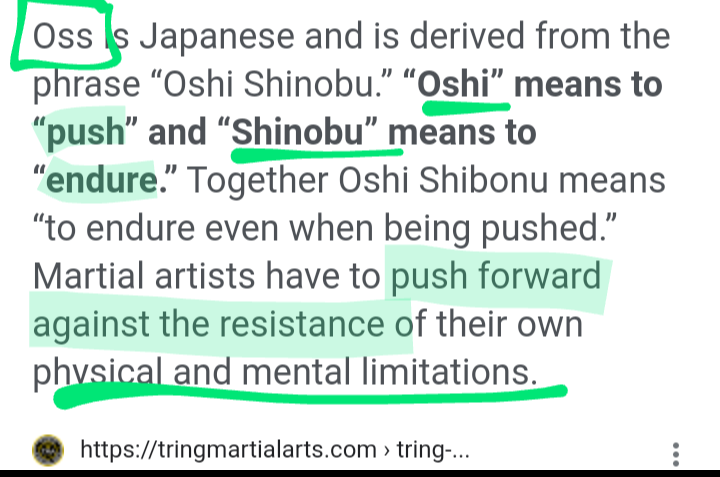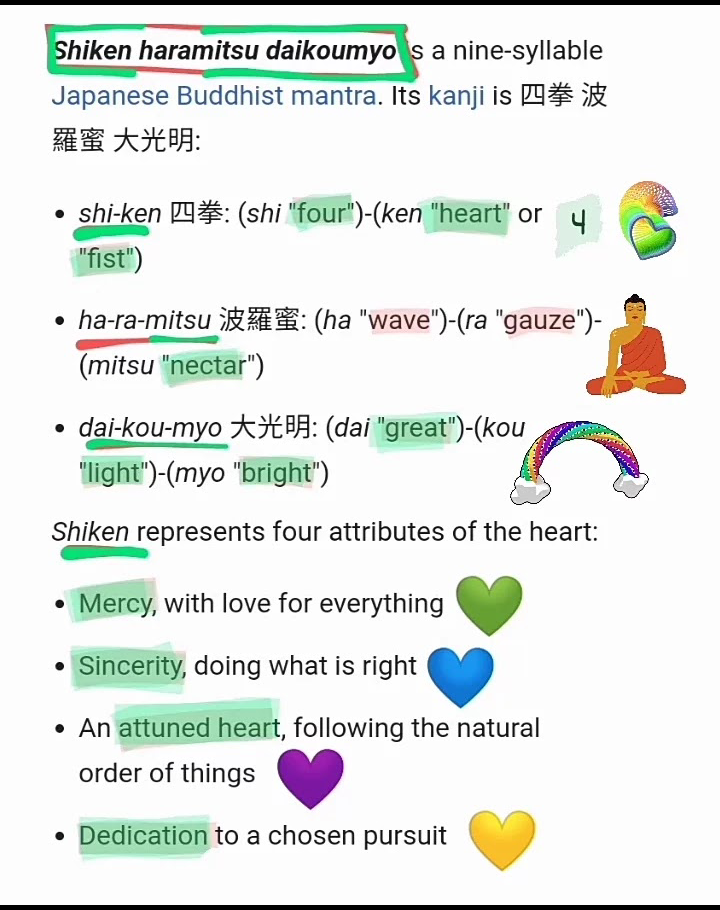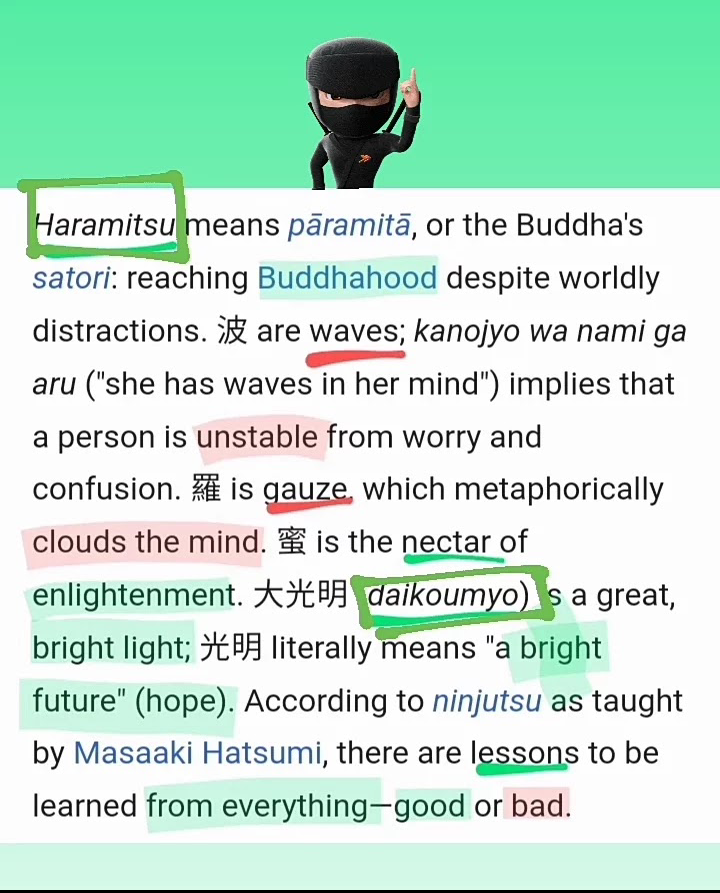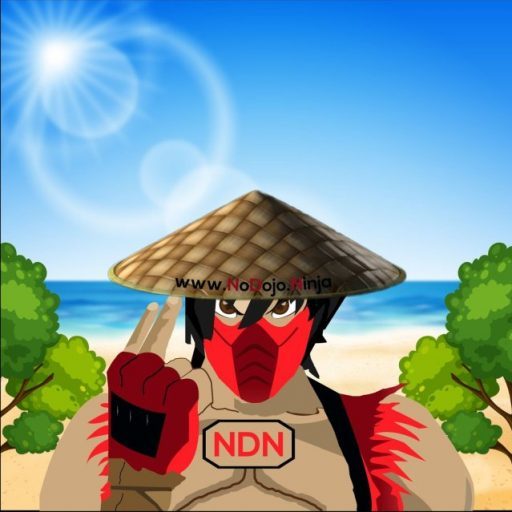Japanese budo language basics is needed to learn budo (way of war) which comes from Japan. It helps to learn the meaning of the words used to descripe many things such as its postures & weapons. Here are some Japanese budo language basics to aid your learning of Ninjutsu.
Before we start learning the language, we must learn about the fantastic culture 🙂
Before we enter the Dojo:

Before we start training, we set our the intention of our training (yes it is enlightenment):


Last published: v11 (updates since last version in yellow highlighting)
If you realize, these are the 4 higher than human-animal elements of fire (perserverance), air (mercy), ether (sincerity), and 3rd eye (attunement to Nature).
Basic
- bu = war
- jin = god / heaven / divine
- kan = house (e.g. bujinkan) (e.g. kukan = ether house meaning 3rd point
- do = way
- jutsu = art
- tai = body
- hen = changing (e.g. taihenjutsu = body-changing art)
- ryu = school
- ninja = one who endures
Directions
- sabaki = movement
- sabaki gata = movement techniques
- tai sabaki = body movement (the 13 directions)
- san shin sabaki = 3 hearts movement (turning & straight)
- mae / zenpo = forward
- ushiro / koho = backward
- yoko = sideways
- sayo = forward diagonal
- nanameh = backward diagonal
- omoteh = outside
- ura = inside
- migi = right
- hidari = left
- down = otoshi / domeh
- up = ag
Fight
- oochi = strike
- gyaku = twist
- ken = strike / sword
- tsuki = strike with hand
- keri / geri (if is after) = strike with leg
- dori = grab
- e.g. (kata or ryo) mooneh dori = chest grab
- e.g. (kata or ryo) te dori = wrist / hand grab
- ho = grab
- doki = release (e.g. te ho doki = hand grab release)
- nage (“nageh”) = throw
- oshi = push
- ganseki = big rock (e.g. ganseki nage = big rock throw)
- taki = bamboo / water (e.g. taki ori = bamboo break)
- doki = free (e.g. taihodoki = release any body part)
- koshu = sensetive point
- shitan = fingertip
- kudaki = break / crush (e.g. oni kudaki = demon crush)
- uzumaki = spiral
- nai = inside <– Hassan
- gai = behind <– Hassan
- sai: thigh <– Hassan
- ???) kagato
- kage = hidden
- kakushi: hidden, hiding Also pronounced Gakushi/Gakure
- tobi: jump
- soku: side / leg
- ashi: leg
- sokuyaku: leg
Body Parts
- te = hand / wrist
- mooneh = chest
- shin = heart
- hara = belly
- tai = body
- ashi = leg
Other
- hanka = variation
- shizen = natural
- kata = form / sequence (no kata when after a word e.g. shizen no kata) / single of something (e.g. kata te = 1 hand)
- ryo = double of something (e.g. ryo te = double hands)
- kamai / kamae = posture
- waza / gata = technique
- tori = technique giver (in Ninjutsu it is usually the defender)
- uke = technique taker (in Ninjutsu is is usually the attacker)
- ukemi = break-fall
- kaiten = roll
- joon = retreating / turning
- yaburi = breaking
- munen muso = no intention / thought
- otonashi = soundless
- han = half
- nagareh = liquid / fluid
- buyu: friend from same martial art
- budoka: someone who train some martial art
- tomodachi: friend
Elements
- chi = earth
- sui = water
- ka = fire
- fu = wind
- ku = ether
- gyo / gyu: jewels
Weapons
- han = 1/2
- hanbo = short / half stick (90cm)
- jo = 130cm
- bo = wood (180cm)
- to = sword
Numbers
- rei (ray) = 0
- ichi (eech) = 1
- ni (nee) = 2
- san (san) = 3
- shi (she) / yon = 4
- go (go) = 5
- roku (roke) = 6
- shichi (seech) / nana = 7
- hachi (hach) = 8
- ku (koo) = 9
- ju (joo) = 10
Kamae (stances)
- monji = character
- Fudoza = immovable seat
- Seiza = correct seat
- Ichimonji = character 1
- Jumonji = character 10
- Hachimonji = character 8
- Bobi = defensive
- Doko = angry tiger
- Shizen = natural
- Hicho = flying bird
- Hira = flat
- Hoko = tiger siege
- Kosei = offensive
- Seigan = truthful eye
- Ihen = changing
More
You may find more Japanese language basics at the following links:
http://bujinkandictionary.wikifoundry.com
http://www.romajidesu.com/dictionary/
http://www.traditional-karate.com/karate/terms
http://www.ninjutsu.org.uk/japanese_dictionary.html
Online (& offline) updated, personalized, & guided video-based courses with weekly live-video feedback & community membership are available @ https://www.ko-fi.com/mowrow/commissions.
Remember to subscribe via the form below or on the right for updates & promotions!
